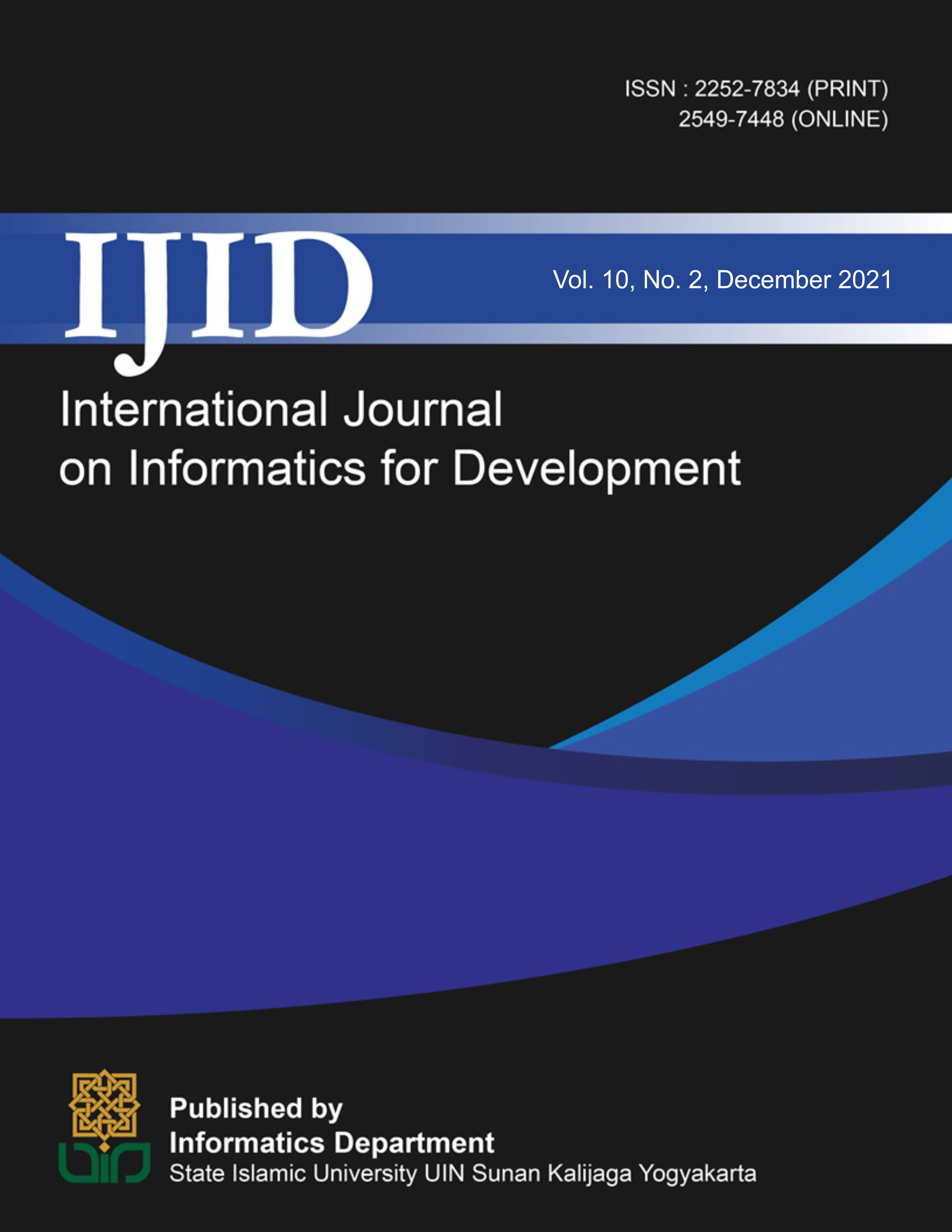Abstract
Learning process in campus has undergone several fundamental changes since the COVID-19 pandemic. The face-to-face lectures cannot be fully implemented due to the increasing number of COVID-19 cases. The education sector continues to make some improvisation in learning methods. This study aims to measure the level of operational feasibility of a Moodle-based Learning Management System at University of Proklamasi 45 Yogyakarta. This study used Taro Yamane Formula as the sampling method. There are 1517 total students in the population with a minimum sample of 94 (error margin of 10%) requirement (actual sample = 120). The data were obtained from the dissemination of questionnaires, using linked scales processed using SPSS software. The respondents are the students, lecturers and academic staffs as the person in charge of the e-learning platform UP45. This method resulted in a decision on the use of e-learning along with the operational feasibility of the online learning system implemented at University of Proklamasi 45 Yogyakarta. The general conclusion of this study is that the operational feasibility of E-Learning UP45 Yogyakarta, can be used as a digital learning solution during the Covid-19 pandemic. The valid percentage that supports the implementation and maintenance of an online learning LMS-based is 72.5%.
References
O. I. Handarini and S. S. Wulandari, “Pembelajaran Daring Sebagai Upaya Study From Home (SFH).,” J. Pendidik. Adm. Perkantoran, vol. 8, no. 3, pp. 465–503, 2020.
R. H. Sakti, S. Sukardi, M. Giatman, E. Nazar, W. Wakhinuddin, and W. Waskito, “Flipped Classroom-Computer Based Instruction untuk Pembelajaran Revolusi Industri 4.0: Rancang Bangun dan Analisis Kebutuhan,” Edumatic J. Pendidik. Inform., vol. 4, no. 1, pp. 63–72, 2020.
A. Wibaselppa, S. Rumangkit, and M. Saputra, “Tingkat Kepuasan Mahasiswa Atas Kinerja Dosen Pada Pembelajaran Online Masa Pandemi Covid - 19 Di Iib Darmajaya,” J. Manag. Accounting, Econ. Bus. http//trianglesains.makarioz.org P, vol. 02, no. 03, pp. 427–441, 2021.
A. A. Hakim, A. M. Sholikhah, D. Agustia, R. C. Dewi, and N. Rimawati, “Gambaran Kualitas Pembelajaran Daring , Pelayanan Akademik , dan Tingkat Kepuasan Mahasiswa di Masa Pandemi COVID-19,” Ilmu Pendidikan, Keguruan, dan Pembelajaran, vol. 5, pp. 135–143, 2021.
A. I. Ilias, H. F. A. Hasan, and R. A. Rahman, “Student Satisfaction and Service Quality: Any Differences in Demographic Factors?,” Int. Bus. Res., vol. 1, no. 4, pp. 131–143, 2009.
A. Supriyanto, Aswandi, and H. M. Chiar, “Manajemen Mutu Layanan Pendidikan Di Sekolah Menengah Atas Karya Sekadau,” J. Pendidik. dan Pembelajaran Khatulistiwa, vol. 6, no. 2, pp. 1–15, 2017.
A. Setiawan, N. Qomariah, and H. Hermawan, “Pengaruh Kualitas Pelayanan Terhadap Kepuasan Konsumen Popolo Coffee,” Sains Manaj. Dan Bisnis Indones., vol. 9, no. 2, pp. 114–126, 2019.
S. Sanora, “English Students’ Satisfaction With Online Learning At English Education Program of Muhammadiyah,” vol. 01, no. 03, pp. 184–199, 2021.
D. Keržič et al., “Academic student satisfaction and perceived performance in the e-learning environment during the COVID-19 pandemic: Evidence across ten countries,” PLoS One, vol. 16, no. 10 October 2021, pp. 1–23, 2021.
N. K. Suryani and I. A. P. W. Sugianingrat, “Student E-Learning Satisfaction During The Covid-19 Pandemic in Bali, Indonesia,” J. Econ., vol. 17, no. 1, pp. 141–151, 2021.
G. Ponto and N. Nurlaily, “Students’ Satisfaction Level Towards Online Learning Compared To Traditional Classroom For English Subject,” Jet Adi Buana, vol. 5, no. 02, pp. 131–138, 2020.
A. Ratna, S. Dewi, and M. Sangkala, “Quality of Service , Performance Lecturer To Satisfaction of Students , Graduate Quality and,” Int. J. Manag. Appl. Sci., vol. 4, no. 6, pp. 59–62, 2018.
F. A. Alam, “The Survey on Students ’ Satisfaction Degree towards Online Learning during Covid-19 Pandemic Condition,” vol. 3, no. 1, pp. 44–56, 2022.
Y. B. Rajabalee and M. I. Santally, Learner satisfaction, engagement and performances in an online module: Implications for institutional e-learning policy, vol. 26, no. 3. Education and Information Technologies, 2021.
S. Ghaderizefreh and M. L. Hoover, “Student Satisfaction with Online Learning in a Blended Course,” Int. J. Digit. Soc., vol. 9, no. 3, pp. 1393–1398, 2018.
S. Hettiarachchi, B. W. R. Damayanthi, S. Heenkenda, D. M. S. L. B. Dissanayake, M. Ranagalage, and L. Ananda, “Student satisfaction with online learning during the COVID-19 pandemic: A study at state universities in Sri Lanka,” Sustain., vol. 13, no. 21, 2021.
Y. W. Lin, C. L. Tseng, and P. J. Chiang, “The effect of blended learning in mathematics course,” Eurasia J. Math. Sci. Technol. Educ., vol. 13, no. 3, pp. 741–770, 2017.

This work is licensed under a Creative Commons Attribution-NonCommercial-NoDerivatives 4.0 International License.
